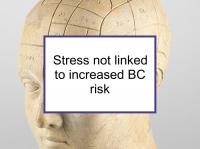Although stress is popularly believed to be associated with breast cancer risk, most studies do not bear this out. Stressful life events are not associated with heightened risk of breast cancer, according to available evidence. Events studied include trauma during childhood and emotionally devastating events during adulthood.
The implication is that emotional stress does not contribute to DNA damage that could lead to breast cancer, nor does it appear to be detrimental to the functioning of the parts of the immune system that may be involved in suppressing cancer. Now a large new prospective study has found no significant associations between acutely stressful events, chronic stress, degree of social support, optimism, anti-emotionality or anger control, and breast cancer risk among women with a family history of the disease.
Stress and breast cancer survival
On the other hand, there are some factors related to stress that have been linked by researchers to breast cancer prognosis. Social isolation and depression both appear to have the potential to reduce survival. One study of breast cancer survivors reported that larger social networks were associated with better breast cancer-specific and overall survival. Several studies have reported that social isolation promotes mammary tumor growth in mouse models of breast cancer. In one, use of media that had been used to culture mammary tissue from isolated mice resulted in increased proliferation of mammary tumor cells compared to media from group-housed mice. Another study found that depression promotes breast cancer bone metastasis.
Isolation and depression can result in suboptimal treatment
Perhaps one of the obvious effects of a high level of stress or a personality that does not incorporate superior coping skills is an inability navigate breast cancer diagnosis and treatment in an optimal fashion. Unless a woman's breast cancer is remarkably uncomplicated (i.e., a small early stage hormone receptor positive tumor that can be treated with lumpectomy followed by radiotherapy), there are likely to be a number of important decisions to be made regarding treatment and the women herself may have to exert some effort to obtain appropriate treatment in a timely manner.
While ideally there will be a member of a the cancer treatment team to guide a patient through this process, in practice this often does not occur. A detour into alternative cancer treatment (such as an attempt to cure the cancer with a specialized diet), triggered in part by anxiety about treatments such as surgery, radiation or chemotherapy, can also result in a suboptimal outcome for those who would need additional support to proceed immediately with the most effective available medical treatments. Delays in treatment, for whatever the reason, can potentially result in a suboptimal long-term outcome, especially for those with aggressive types of breast cancer.
Latest research: No link between stress & BC risk in high risk women
The Australian prospective study referenced above was designed to investigate the association between stressful life events, social support, and personality characteristics (optimism, anger control, and anti-emotionality) and breast cancer incidence among women at heightened risk of the disease based on family history. Study participants were recruited through the Kathleen Cuningham Foundation Consortium for Research into Familial Breast Cancer. The foundation collects genetic, epidemiological, and clinical data concerning Australasian families with multiple cases of breast cancer. The study included 2,739 women from 990 families. A total of 103 participants were diagnosed with breast cancer during the study.
Data concerning acutely stressful life events and chronic stressors for the previous three years and psychosocial, clinical, and epidemiological variables were measured at study enrollment and at three-year intervals. The primary endpoint was histopathologically confirmed breast cancer, including invasive breast cancer and ductal carcinoma in situ (DCIS) (including cancer found incidentally during prophylactic mastectomy). The authors adjusted for breast cancer risk factors and familial clustering.
None of the acute or chronic stressors or psychosocial variables or interactions between them were found to be significantly associated with breast cancer risk in the adjusted (or unadjusted) models. The authors conclude that the study did not find an association between acute and chronic stressors, social support, optimism, anti-emotionality or anger control, and breast cancer risk. The authors further comment that women should focus on proven methods of breast cancer risk reduction.
